REVIEW
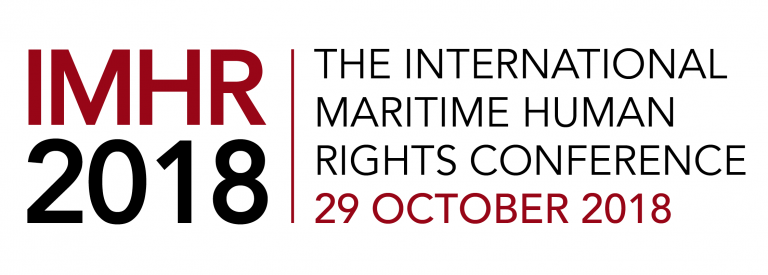
“Human rights and dignity must be a high priority for the maritime sector”.
Nusrat Ghani MP, Parliamentary Under Secretary of State for Transport, 29 October 2018
London. UK. On 29th October 2018, the second International Maritime Human Rights (IHMR 2018) conference was held at The Fishmonger’s Hall, London with strong international attendance.
Delegates attended from around the world including USA, China, Brussels, Libya and Australia, and included leaders in business and human rights development, lawyers, academics, film-makers, heads of the main maritime welfare organisations and Government civil servants from the UK Department of Transport and other States. Unfortunately, there was limited participation from the mainstream shipping industry.
The inaugural IMHR 2016 conference was a first for the charity, and also within the emerging explicit subject area of maritime human rights. It provided the first opportunity to ‘test the waters’ for the appetite for bringing together interested parties to discuss and share tools, concepts and lessons learned in addressing the prevention of abuses at sea.
The IMHR 2018 Programme was comprehensive and covered multiple areas from slavery and trafficking, auditing, legal reviews, safety and welfare in the global fisheries sector, seafarer well-being and emerging educational materials.
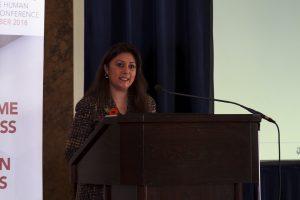
The Key Note speech was kindly delivered by Nusrat Ghani MP, Parliamentary Under Secretary of State for Transport in which she highlighted that: “human rights in the maritime sector” was “an issue of enormous importance to the future of the industry and one, that is amongst my top priorities as a maritime Minister”. The Minister further highlighted the need to attract the right people to work at sea , under the right working conditions, and provide fair pay for fair work.
Following presentations covered a broad, but related spectrum of issues under the business and human rights umbrella.
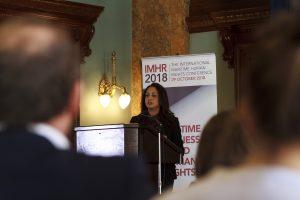
These included Parosha Chandran, Barrister-at-Law, opened with the point that: “slavery on the seas chills you to the bone…you can’t think of a more vulnerable community of people who don’t have anywhere to run to, to ask for help and save them.” She highlighted that on the issue of slavery at sea, we are collectively at the beginning of litigation in this field, with obstacles including extra-territorial jurisdiction and its absence at sea. The potential answer, besides legal actions, was suggested to maybe focus on “moral leadership, creativity and having smart solutions”. She highlighted that Thailand’s seafood industry abuses first reported by The Guardian in 2014, and according to the latest HRW report, continue unabated.
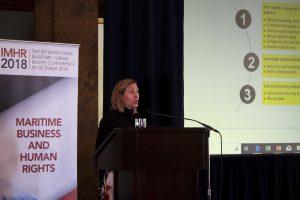
Anna Jakobsen from Ernst & Young delivered a detailed review of the value of audits in detecting human rights abuses in which she highlighted business capital being channel through responsible investment, noting that links to human rights and labour rights abuses can have a detrimental effect on access to finance. Anna further highlighted the need to engage with local NGOs who had the “deep connections” and could offer “unique insights” in the environment and context. Further “worker enabled engagement” and one-on-one sessions during audits were necessary for transparency and understand what is happening at the front end.
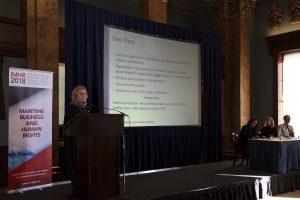
Within the UK, Lysbeth Ford of the Gangmasters and Labour Abuse Authority provided an overview of the Authority’s background and their mission to tackle worker exploitation of vulnerable people in the agricultural industry for “people who don’t have a voice” through tackling unlicensed, organised national and international criminal activity under wide UK legislation. This in enforced through Labour Abuse Prevention Officers with up to a two year custodial sentence for abuses which are not rectified. Lysbeth reinforced that modern slavery exists throughout public life and the difficulties of getting away from such abuses at sea, and showed an informative and statistical film highlighting the scale and context of modern slavery.
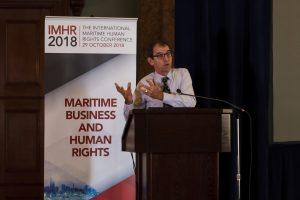
Taking the perspective of public reporting of abuses within the global supply chains, Phil Bloomer, CEO of the Business and Human Rights Reporting Centre, clearly articulated the need for databases, of their monitoring over 8000 companies around the World and systematic abuses such as the Indonesian migrant crews being used and abuses in bonded labour on Taiwanese far-fleet fishing vessels working up to 22 hours a day and half the wages of Taiwanese crew. He stated that modern slavery was: “the removal of the most fundamental dignities and human freedoms from our fellow human beings”. There is “no supply chain that does not have modern slavery within it”. He highlighted the route to solutions through monitoring and benchmarking of companies and their practices, but reinforced the collusion between companies and social audit firms at Tier 1 to cover up abuses as highlighted through a whistleblowing case from the apparel industry. Policy and transparency, due diligence and remediation is essential in any company, as set against international standards.
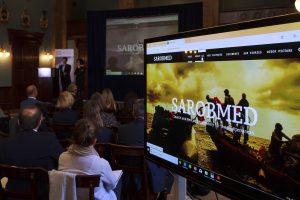
The current ongoing Central Mediterranean migrant issue was covered by Dr. Violeta Moreno-Lax & Oscar Pejuelo of Queen Mary University, London, with the introduction to the Search and Rescue Observatory for the Mediterranean. They covered the background to the lack of statistical databases for migrants crossing, migrant deaths, cases of push backs to Libya and the ramifications of closure of Italian and Maltese ports against the varying political positioning within European States. Humanitarian assistance was highlighted as being criminalised and being conflated with alleged smuggling activities. The mission is to set up an independent observatory for detailing human rights violations and support academic research and analysis of trends of migrant flows and human rights violations at sea.
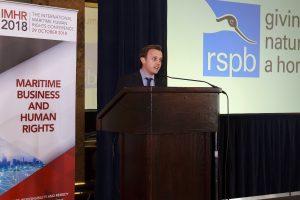
UK Overseas Territories and fishermen’s welfare in relation to Tuna fishing fleets operating in the South Atlantic and around the Ascension Island Economic Exclusion Zone, was covered by Jonathan Hall of the RSPB as a case study. Jonathan highlighted that RSPB has a large sustainable fisheries programme, including in the UK, Africa, the Baltic and the South Atlantic originating from seabird by-catch from fisheries and which has developed into the field of human rights and welfare onboard fisheries vessels operating around any of the 14 UK overseas territories around the World (i.e. Pitcairn Islands, Falklands, Tristan da Cuna, Anguilla). He further highlighted the issue of licensing to foreign-flagged fishing vessels and need for increased human rights standards.
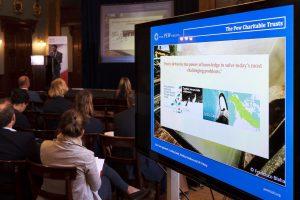
Continuing the fisheries and welfare theme, Nikolas Evangelides of PEW Charitable Trusts, focusing on the Ending Illegal Unregulated and Unreported (IUU) fishing campaign and the challenges of use of regulation, enforcement, information sharing and the global scope in dealing with the issue. The campaign is underpinned by use of technology for the likes of vessel behaviours, working with the likes of the UN FAO, ILO and maritime organisations, supported by objective fact finding which is published, and underpinned by established international conventions, including the pending Cape Town Agreement.
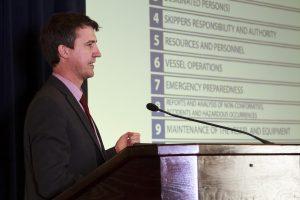
From a UK Perspective, Robert Greenwood of the National Federation of Fishermen’s Organisations (NFFO) trade body spoke about representing the catching sector as part of the fisheries supply chain, and the ongoing work in the industry to develop an increased focus on human rights in the sector. He highlighted the NFFO work for the ILO C188 Work in Fishing Convention and UK legislation, the development of the Fishermen’s Welfare Alliance, the Fishing Safety Management Code and links with the 2011 UNGP’s and the 2015 Modern Slavery Act. Robert went on to discuss the roll-out of the fishing Safety Folder on-line tool in supporting and managing enhanced safety and welfare provisions in the UK Fleet.
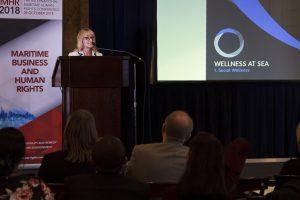
Switching to wider maritime industry seafarer health, and the Wellness at Sea Programme, Sandra Welch of The Sailors Society presented the background to and the need such a programme based on recognised issues of mental, social and physical health at sea. The programme is being backed by academic research by Yale University and has been run out supported by coaching, trainer-the-trainer training, 20 hours of e-learning educational materials and an App which enables seafarers to monitor and maintain their all-round well-being and fitness. The strapline is: “health and well-being is only a click away”.
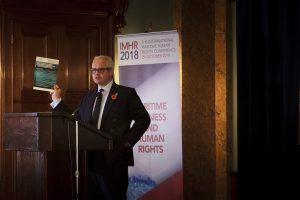
The final session was delivered by the charity’s Founder, David Hammond, who focused on the development by the charity of free educational materials in respect of maritime business and human rights, what it means, how it affects the supply chain and the key questions to be asked of management when looking at affecting inclusion of the 2011 UN Guiding Principles in daily business practices. He highlighted the need for continuing the ‘human rights at sea’ narrative, the need for continuous and wide education on rights, the need for true collaboration between entities and avoidance of empire building, increasing commercial awareness in terms of the need to address human rights protections and provisions at sea; and the consequences of brand damage for failing to provide remediation and effective remedy. Three short animated educational films were shown and are available free to download online.
LifeBoat Film
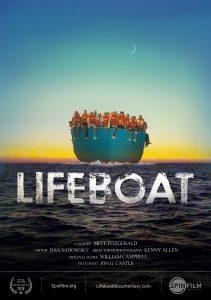
After the main event, the delegates were shown the short film ‘LifeBoat‘ by the US documentary film maker, Skye Fitzgerald.
LIFEBOAT showcases refugees desperate enough to risk their lives in rubber boats leaving Libya in the middle of the night, despite a high probability of drowning. With few resources but certain that civil society must intervene, volunteers from a German non-profit risk the waves of the Mediterranean to pluck refugees from sinking rafts.
The film has now been shortlisted for an Oscar.
Organiser
The Trustees of Human Rights at Sea would like to thank their colleague, Amanda Hastings, for all her hard work and sustained effort in successfully bringing all aspects of the conference together.
Sponsors
The IMHR organisers would like to thank all sponsors and donors for their generous support in making the conference a success, including The Fishmongers Company, The John Ellerman Foundation, Seafarers UK, and By Sea coffee from the Sailor’s Society.
The Next Event
The third International Maritime Human Rights conference will be scheduled for 2020.
For More Information:
IMHR Website: www.mar-rights.com
Download the IMHR 2018 Conference Guide HERE
View all speaker films on the Human Rights at Sea Channel
